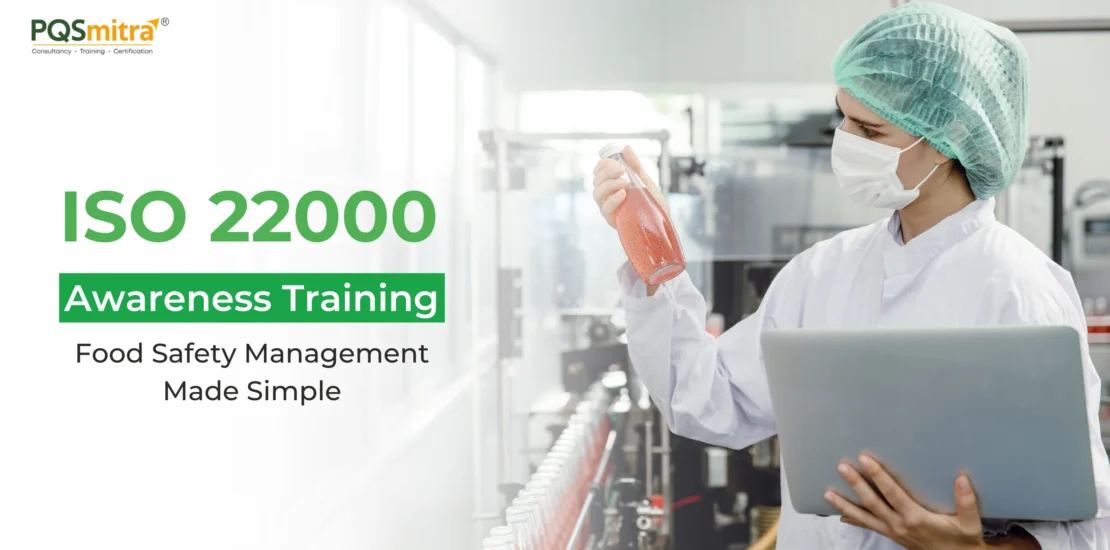- November 16, 2024
- Posted by: PQS_Mitra_Main_Access
- Category: ISO Certification

Introduction
In today’s interconnected global food supply chain, food safety is a shared responsibility—across manufacturers, suppliers, transporters, and retailers. A single gap can cause widespread disruption, brand damage, or worse, public health risks. That’s why food safety management can no longer be just a department’s job—it must be embedded in an organization’s culture.
ISO 22000 is the internationally recognized standard for Food Safety Management Systems (FSMS). It provides a comprehensive framework to identify, prevent, and control food safety hazards throughout the supply chain. But knowing the standard exists is only the beginning—awareness is what brings it to life.
Why Food Safety Isn’t Just About Hygiene
Food safety goes beyond hairnets and gloves. It’s about creating systems that consistently deliver safe products—regardless of changes in personnel, raw materials, or processes.
ISO 22000 brings together key food safety elements, including:
- Hazard Analysis and Critical Control Points (HACCP)
- Prerequisite Programs (PRPs)
- Communication along the supply chain
- System management and continual improvement
While food handlers and production staff play a frontline role, the responsibility doesn’t stop there. Procurement teams must evaluate safe suppliers, maintenance teams must prevent contamination risks, and leadership must ensure a culture that values compliance and accountability.
But all this hinges on one thing—organization-wide understanding.
How Food Incidents Reveal the Gaps
Unfortunately, many organizations only realize the importance of awareness when an incident occurs—whether it’s a product recall, audit non-conformance, or regulatory penalty. In many such cases, the root cause isn’t a missing SOP—it’s a lack of awareness or misunderstanding of responsibilities.
It’s common to hear questions like:
- “What exactly is a critical control point?”
- “Who is responsible for allergen management?”
- “Do cleaning records affect audit outcomes?”
- “What if suppliers don’t follow our safety standards?”
These questions show a genuine need for structured awareness. And answering them proactively can prevent non-compliances later.
Awareness Builds the Foundation for Food Safety Culture
When food safety becomes part of daily conversations—across departments and roles—it becomes a culture, not just a compliance task. ISO 22000 awareness helps teams understand:
- What food safety risks exist and how they arise
- How individual roles impact the safety of the end product
- Why traceability, recordkeeping, and supplier control matter
- How communication across the supply chain supports prevention
- The role of leadership and accountability in building trust
By making ISO 22000 simple and relatable, awareness training helps organizations move from reactive fixes to proactive prevention.
When Awareness Training Makes a Difference
Most companies seeking ISO 22000 certification soon discover that documentation alone doesn’t ensure compliance. Auditors look for evidence of awareness—whether employees understand policies, can identify risks, and take responsibility.
This is especially relevant for:
- Food processors and packagers
- Cold chain and logistics operators
- Ingredient suppliers
- Retail food businesses
- Hospitality and catering services
In such environments, awareness training is not just helpful—it’s essential. It ensures consistency across shifts, locations, and supply partners. It also prepares organizations for audits and regulatory inspections with greater confidence.
The Role of Training in Strengthening FSMS
ISO 22000 awareness training plays a critical role in translating requirements into everyday practices. It empowers employees to speak up, take ownership, and prevent issues before they escalate.
Effective awareness programs focus on:
- Simplifying key ISO 22000 clauses for easy understanding
- Explaining food safety hazards (biological, chemical, physical)
- Identifying and managing critical control points
- Strengthening documentation and traceability practices
- Encouraging cross-functional collaboration
These sessions are best delivered in a format that suits your operational structure—whether onsite or online—and often include real-life examples to make learning practical and impactful.
Conclusion
Food safety doesn’t happen by chance—it’s the result of a well-informed, engaged, and responsible workforce. ISO 22000 offers a structured path to building reliable food safety systems, but it’s awareness that gives the system strength and sustainability.
When employees across departments understand why food safety matters and how they contribute to it, organizations move from basic compliance to true food safety leadership.
PQSmitra offers ISO 22000 awareness training sessions—conducted online or onsite—with certification. These sessions are designed to simplify the standard, clarify responsibilities, and build a robust food safety culture from the ground up.
Leave a Reply Cancel reply
Kindly submit a business inquiry online and we will get back to you!
OR
Call us on 022-2893 8687 | +91-9820204373
